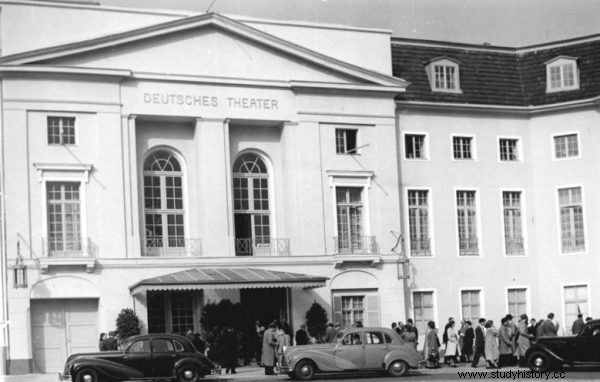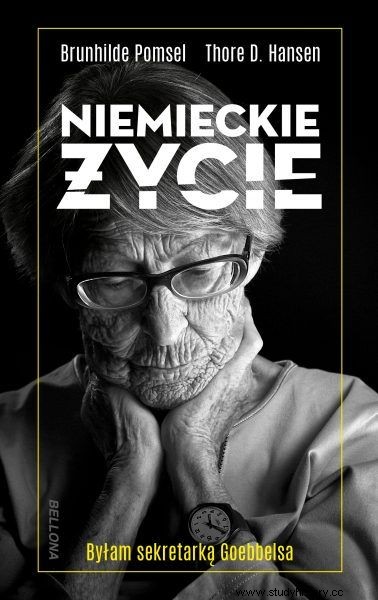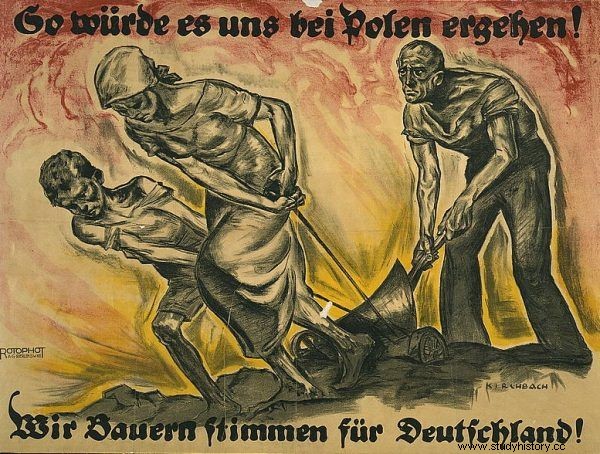Brunhilde Pomsel worked for three years at the heart of the Nazi lie machine - at the Ministry of Propaganda headed by Joseph Goebbels. And she never regretted it.
"Only men will take part in the Nazi revolution," decided Adolf Hitler. He was furious when women marched alongside men at one of the rallies in Nuremberg. He scolded Baldur von Schirach, the head of the Nazi youth, for this. The chief believed that women should stay at home and give birth to blue-eyed Aryans, and not get involved in politics!
After coming to power, he and the later head of propaganda, Joseph Goebbels, repeatedly emphasized that women were made to implement the old German maxim - "Kinder, Kuche, Kirche" (Children, Kitchen, Church - although the Nazis did not like the latter). The problem, however, is that the Nazi machine could not cope without an army of secretaries, assistants and typists patiently ensuring that its modes did not stutter. One of them was Brunhilde Pomsel.
"We didn't think much about the Jews"
She was born on January 11, 1911 in Berlin. Her father was drafted into the army right after the outbreak of World War I. Luckily he survived, he wasn't even hurt. But the conflict left its mark on him - he remained silent for the rest of his life. Brunhilde had four more brothers whom she always insisted she had to look after constantly.

Before joining the Ministry of Propaganda, Brunhilde Pomsel worked briefly as a secretary, incl. at the Deutsche Theater in Berlin (photo from October 1953).
The punishment for disobedience was beating. The father raised the children in Prussian discipline. There was no room for weakness. For example, he forbade them from using potty pits in their rooms. "We had to be brave and go to the washroom," she told the Guardian reporter at the end of her life. - "It has remained in me, this is something Prussian, this sense of duty" .
Brunhilde's father was a decorator, her mother did not work. Although the family was not wealthy, it was not affected by the economic crisis raging after the war in the Weimar Republic. Moreover, my parents could afford Brunhilde to continue her education for one year after finishing primary school.
The resolute girl wanted something more in her life. She was impressed by her smartly dressed clerks who made their way to the office every day. So she learned shorthand without respite. Kurt Gläsinger i Co. She found another job in a law firm also owned by Jews. “Before 1933, you didn't think much about Jews,” she explained in her memoirs written in the book “German Life. I was Goebbels' secretary. - "It was only National Socialism that made us realize that they were different people."
Playing with the party
National Socialism appeared in Brunhilde's life in 1932 along with his friend Heinz. The man took her to Sportpalast, where, instead of sports emotions, propaganda speeches were waiting for her. “Don't ever invite me to something like that again. It was boring as oiled guts ”She told the boy she soon broke up with. Before it happened. however, he had met her with another Nazi, Wulf Bley, a World War I pilot who needed help in writing down her memoirs. This meeting was going to make a difference in the rest of her life.
In 1933, the Nazis won the elections, and Bley, though completely incompetent, joined the Deutsche Theater as literary director. "This artistically dull man," as Pomsel called him, pulled her in, and after a few months he transferred her to the radio with her. Bley's shortcomings were not concealed for long, however, and at the end of the year he left the radio station. Pomsel stayed - in the news section.

In the meantime, she joined the party, although - as she always emphasized - she did it out of sheer opportunism and not out of conviction. Was it really so, or was she just bleaching? It is not known. However, it did not belong to the NS-Frauenschaft (Nazi women's organization - author's note). “There was no compulsion to belong, but they persuaded you to join. I did not want to join any mass movement, I have always rejected it, "she recalled.
Interestingly, Christa Schroeder, Hitler's secretary, also declared that she did not want to join the party. She did it only to get a job at the SA headquarters in Munich. She allegedly claimed that had she been offered a job in the Communist Party of Germany at the time, she would not have hesitated for a moment. She wanted to earn and the views of her employer were not important to her.
Pomsel preferred to play than to engage in politics. She was flashing as much as she could from the group trips organized by the Third Reich although due to the place of work, it should participate in them. She wasn't the only one. "When I started working for the state radio, we always had to march to the Reichs Stadium or Tempelhof airport on the first of May when Mussolini arrived," she recalled. - “Once upon a time, I recall, it was a march to the Olympic Stadium. We were supposed to meet in front of the radio station. But our department made an appointment at the pub. Every five minutes, one of us left the march and preferred to go for a beer. Out of the twenty people in the stadium, only two kept appearing. ”
Desk at Wilhelmplatz
The fun ended on Crystal Night. Then Pomsel and her friends saw what the Nazis were capable of. "We were all paralyzed that something like this could happen" - she recalled in the book “German Life. I was Goebbels' secretary. “That's when it actually started. We've been awakened. " For Pomsel, however, the wake-up call should have happened two years earlier, when her beloved, half-Jew, Frietz Gottfried Kirchbach, left Berlin after the Olympics.

One of the graphics by Pomsel's pre-war boyfriend, half-Jew Fritz Gottfried Kirchbach, showing the superiority of Germany over Poland.
He left for Amsterdam, where a pregnant Brunhilde was to join him. She even visited him several times, but for reasons not fully explained, she decided not to emigrate. The doctor, out of concern for her health (she had lung disease), advised an abortion ... Later Pomsel did not do anything that could endanger her. She could feel professionally fulfilled - she belonged to the clerical caste, earning over 200 marks, much more than her friends. It was enough to close her mouth.
She was not happy with the outbreak of the war. More and more of her friends from the radio went to the front (her two brothers were also killed during the fights). Brunhilde began to… bored in the office filled only with women. It was then that an offer that could not be refused came. “Our Human Resources Department has always been used by the Ministry of Propaganda. One day, a typist was sought there. »Well, since Monday your desk has been standing here at Wilhelmplatz«, she explained years later. This is how her "great adventure" began.
Noble and… stupid
She was assigned to Kurt Frowein, one of Joseph Goebbels' press officers. She shamed, made phone calls, and when the bell rang, she or one of the other girlfriends sitting in the room next to the minister's office ran to jot down what he wanted to say. However, it mainly rewritten data on losses on the Eastern Front, and later - on orders - exaggerated information about the atrocities of Soviet soldiers.

The Russians razed the building of the Ministry of Propaganda, where Brunhilde Pomsel was hiding with other workers at the end of the war.
She had access to the most secret documents, but did not make use of it. Once she was entrusted with the case dossier of Sophie Scholl, a member of the White Rose (Resistance - author's note). The boss ordered Pomsel to take the documents to the armored cupboard. Though she was interested in the matter, she did not look inside. As she explained in the book “German Life. I was Goebbels' secretary ":
I was very proud of the trust he placed in me. It was more important than satisfying curiosity. I thought I was very noble. (…) Everything was nice, I liked it. Nice dressed, kind people. I was still very superficial then, very stupid .
Another sobering came after the defeat at Stalingrad. Pomsel and a friend were invited to the speech of their boss at Sportpalast. She was sitting with the entire party top, near Magda Goebbels, whose husband shouted from the rostrum:"Do you want total war?". Both secretaries were terrified of their elegant boss turning into a "raging dwarf." The crowd ran amok. The women, terrified of fear, forgot their applause. Fortunately, someone like them discreetly reminded them of this…
"I'm guilty if I do something"
Pomsel, however, did not quit her job. Moreover, like the Führer's secretaries, she decided to stay with her boss until the end , although a friend offered her a chance to escape from Berlin besieged by the Russians. She spent over a week in an air-raid shelter of the Ministry of Propaganda, despite the fact that there was basically nothing else to do. The workers were drinking alcohol, eating canned food and hoping for a victory for Wenck's army.

On April 30, those hopes were dashed. Hitler committed suicide. A day later the Goebbels killed themselves, poisoning their children before that. And this was what she could not forgive the former Pomsel boss until the end of his days. “That Goebbels took his own life, okay, there was probably nothing else left for him. But the rest is cowardice. Children involved - unforgivable! " - she said at the age of 105.
Pomsel was arrested by the Russians after Berlin's surrender. The NKVD placed her successively in three former concentration camps. In total, she spent 5 years there. She was released in 1950, fled to West Germany and ... found a job again on public radio. She retired 20 years later. She did not return to her youth spent in the Ministry of Propaganda until the end of her long 106-year-old life. Then she agreed to an interview, which resulted in a documentary and a book.
She never felt guilty. " I didn't do anything except typing for Mr. Goebbels. No, I won't feel guilty. I am guilty if I do something, ”she explained shortly before her death. She died on January 27, 2017 in Munich.
Buy the book cheaper at the Publisher's bookstore:

